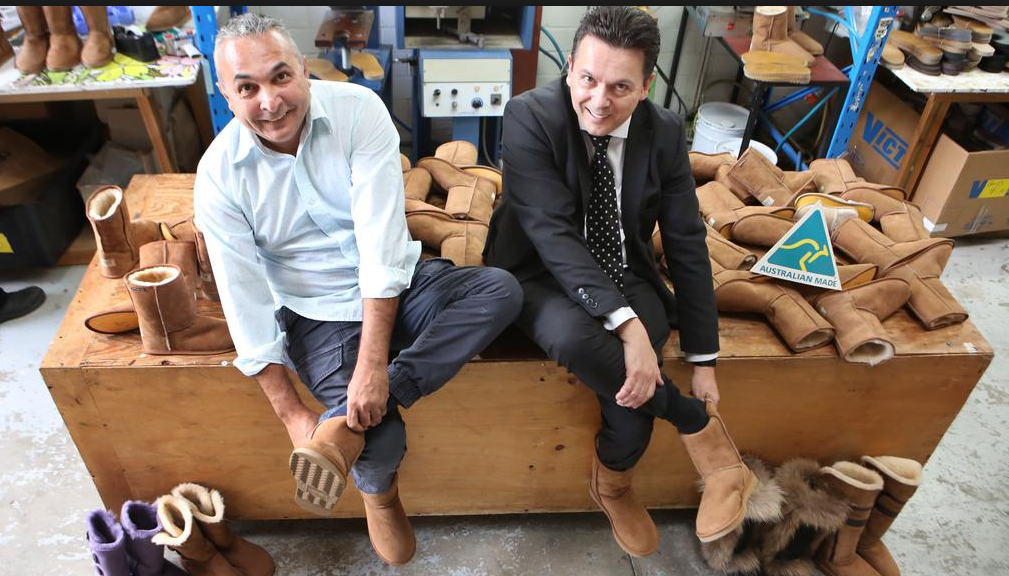Australian Leather Ugg Boots
Eddie Oygur, has been ordered by a Chicago court to pay US$450,000 ($643,500)
BATTLING AUSSIE UGG BOOT MAKER VOWS TO APPEAL CHICAGO JURY VERDICT ORDERING US$450,000 PENALTY FOR SELLING 12 PAIRS OF UGG BOOTS INTO THE US
Battling Western Sydney Ugg boot maker Eddie Oygur, owner of small business Australian Leather P/L, is devastated after a Chicago jury overnight ordered him to pay US$450,000 (over $640,000) in statutory damages after it found that he sold 12 pairs of ugg boots into the US from 2014 – 2016.
In addition, Eddie and his company could face millions of dollars in legal costs incurred by Deckers Outdoor Corporation – on top of the over $1.25 million he’s incurred in US legal fees so far in fighting the case brought against him and his company.
In 2016 Deckers, which owns the “UGG” trademark, sued Eddie and Australian Leather without prior warning alleging breach of trademark, patent infringement in relation to 4 styles of Deckers ugg boots.
A private investigator hired by Deckers bought 4 pairs of ugg boots from the Australian Leather website www.australianleather.com.au in early 2016. Proceedings were issued by Deckers in March 2016 out of the US District Court for the Northern District of Illinois. It finally went to trial this week, with an 8 person jury empaneled.
It was agreed that Australian Leather sold only 12 pairs of ugg boots (4 to the Deckers private detective) and 2 pairs of socks over an 18 month period from October 2014 to April 2016 – worth in total about $2000.
The “bench trial” – a hearing before the judge alone – proceeded on Friday to hear other evidence excluded to the jury. That evidence included a former US Government Patent Attorney Jody Drake, who raised serious questions on whether the US “UGG” trademark should ever have been granted in the first place in 1987, given “UGG” is a generic term for sheepskin boots in Australia since at least the 1960s.
Evidence before the jury included a video deposition of former ugg boot and surfboard maker John Arnold, now in his late 70s, who said not only was “UGG” a generic term in Australia in the 1960s, but he exported may thousands of pairs of ugg boots to the US in the 1960s and 1970s from Adelaide, casting further doubt on how “UGG” was registered as a trademark in the US.
Nick Xenophon is part of Eddie’s Australian legal team led by Michael Terceiro in Australia, and he accompanied Eddie to Chicago for the trial.
Eddie said:
“To say this verdict is devastating would be an understatement. My life savings have already gone into this case, and unless Australians get behind me this verdict will wipe me, shut my business down and destroy the Australian ugg boot industry. I fought this, against a $7 billion US corporate giant, because I passionately believe “UGG” belongs to Australia, for any Australian company to use to make ugg boots for the world.”
Nick said:
“Eddie fought this case for Aussie jobs, but unfortunately his pleas to the Australian Government for legal assistance fell on deaf ears. Now his only immediate hope is for the Australian public to get behind him to help fund the appeal.”
“We wrote to the PM and the Attorney-General for legal funding support expecting a favorable response but had our application refused on the ground that this wasn’t an important enough issue. It seems that the possibility of generating thousands of local manufacturing jobs as well as significant export sales was not seen as an important issue for the current Government!”
“Now is the time for our political leaders to get involved and fight for the Australian ugg boot industry. And the best way to do that is to support Eddie’s appeal – all the way to the US Supreme Court if need be. If the Morrison Government won’t act, I call on all other political leaders to stand up for Australia.”
The ugg boot market is estimated to be worth $8 billion a year in annual sales.
Mr. Xenophon was especially critical of the ACCC failing to take action against Deckers for marketing and marking their ugg boots as “UGG AUSTRALIA” from 2007 to 2017 when Deckers moved production of their ugg boots to China, Vietnam, and the Philippines.
“Deckers had a lot of gall claiming Eddie had misled American consumers (all 8 of them) when for years it misled consumers across the world that their ugg boots were somehow Australian. The ACCC should have stepped in and taken action. Unfortunately, Deckers was effectively able to use the ACCC’s inaction against us in the case.”
Mr. Terceiro was particularly puzzled by a number of Court rulings which went against his client:
“The Court made some surprising orders in the case. For example, we had hoped to take a number of depositions in Australia from witnesses who had been involved in selling ugg boots into the US. At Decker’s urging, the Court decided to limit us to two days of depositions when we had asked for a week. The Court also said we were only allowed to question our witnesses for two hours, whilst Deckers was able to go for as long as they wanted. It seemed to me that the Court made this unusual ruling, which violated out due process rights because it formed the view we were not actually serious about taking any depositions.”
“We also had proposed a key deposition we wanted to use quashed, evidence excluded including the evidence of one of our key experts and an unfavorable summary judgment which meant that many of the key issues we had raised as part of our case could not be put to the jury.”

